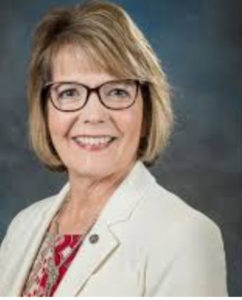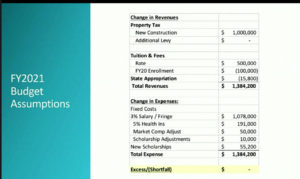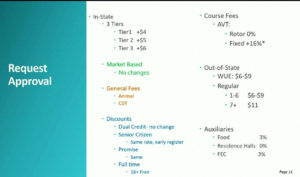Any costs incurred by the Community College for the new program will be paid for by the City, businesses and education community; Yavapai launched its tuition-free program in fall 2019
 Mesa Mayor John Giles announced Tuesday, February 4, the decision to provide free tuition for eligible Mesa Community College students beginning fall 2020. According to Giles, the city of Mesa has been studying the issue for the past year and received recommendations the end of January for starting the Mesa College Promise campaign.
Mesa Mayor John Giles announced Tuesday, February 4, the decision to provide free tuition for eligible Mesa Community College students beginning fall 2020. According to Giles, the city of Mesa has been studying the issue for the past year and received recommendations the end of January for starting the Mesa College Promise campaign.
“The Mesa College Promise means free tuition at community college for eligible students graduating from local high schools,” Giles said during his State of the City address.
Under the direction of Dr. Lisa Rhine, Yavapai Community College has already launched an experimental program somewhat similar to the Mesa effort. In the fall 2019 more than 300 new students enrolled in the program at Yavapai.
It does not apply to students seeking certificates. And there are specific requirements. For example, the Yavapai program is restricted to County residents and they must complete their degree within seven semesters after graduation from high school.
The program provides eligible students a last dollar scholarship, meaning it will cover tuition not otherwise covered by Federal, State, Yavapai College, or other 3rd party (for example, high school, Yavapai College Foundation, Tribe, employer) grants, discounts, or scholarships. However, the program will reimburse no more than 61 credits of the tuition paid by a student.
When an eligible student completes his or her coursework after seven semesters of high school or GED graduation, any tuition that was paid out-of-pocket for tuition will be reimbursed. The program is strictly limited to tuition. It does not reimburse other related expenses including, but not limited to, books, course and program fees, or other cost of living expenses such as transportation, food, and housing.
 Dr. Diane Ryan, Vice President of Strategic Initiatives, explained to the Governing Board how she is developing the free textbook program at Yavapai Community College during the Board’s January retreat. Faculty at the Community College will begin training on how to use Open Educational Resources (OER) material in February. She told the Board that she anticipates that there will be some classes operating with free textbooks by the fall 2020.
Dr. Diane Ryan, Vice President of Strategic Initiatives, explained to the Governing Board how she is developing the free textbook program at Yavapai Community College during the Board’s January retreat. Faculty at the Community College will begin training on how to use Open Educational Resources (OER) material in February. She told the Board that she anticipates that there will be some classes operating with free textbooks by the fall 2020. Yavapai Community College is offering a 25% discount on credit classes to residents age 65+. An applicant must meet all of the eligibility requirements and register for ALL classes between January 6-17, 2020.
Yavapai Community College is offering a 25% discount on credit classes to residents age 65+. An applicant must meet all of the eligibility requirements and register for ALL classes between January 6-17, 2020. It was announced December 20, 2019 that incoming students will pay no tuition or fees at Connecticut community colleges starting next fall under a plan approved by the Connecticut State Colleges and Universities Board of Regents. The Pledge to Advance Connecticut (PACT), is in response to legislation passed last spring. It guarantees that eligible in-state, full-time, first-time students at the 12 campuses will not pay out-of-pocket for tuition or mandatory fees.
It was announced December 20, 2019 that incoming students will pay no tuition or fees at Connecticut community colleges starting next fall under a plan approved by the Connecticut State Colleges and Universities Board of Regents. The Pledge to Advance Connecticut (PACT), is in response to legislation passed last spring. It guarantees that eligible in-state, full-time, first-time students at the 12 campuses will not pay out-of-pocket for tuition or mandatory fees.
 East Valley education advocate Ruth Wicks suggested to the Community College Governing Board at its October 8 meeting that it consider reducing the cost of tuition. Wicks’ noted that during the last few years the College had seen a “dramatic drop in enrollment.” Enrollment has dropped despite increased population growth in Yavapai County and “sister institutions have flourished,” she said.
East Valley education advocate Ruth Wicks suggested to the Community College Governing Board at its October 8 meeting that it consider reducing the cost of tuition. Wicks’ noted that during the last few years the College had seen a “dramatic drop in enrollment.” Enrollment has dropped despite increased population growth in Yavapai County and “sister institutions have flourished,” she said.
 Yavapai Community College is moving ahead with its program that will provide degree seeking students an opportunity to attend tuition-free. The program is restricted to County residents. This fall, according to Vice President Clint Ewell, more than 300 new students are in the program. It does not apply to students seeking certificates.
Yavapai Community College is moving ahead with its program that will provide degree seeking students an opportunity to attend tuition-free. The program is restricted to County residents. This fall, according to Vice President Clint Ewell, more than 300 new students are in the program. It does not apply to students seeking certificates.
